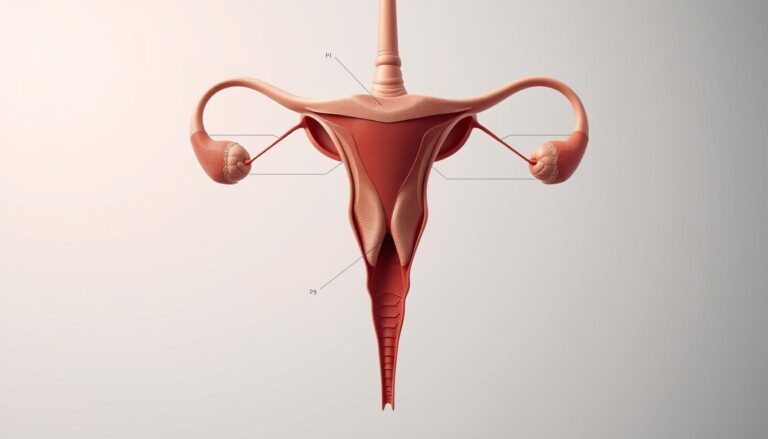Reproductive Health: How to Boost Fertility Naturally
Table of Contents
Starting your journey to have a baby can feel like exploring new territory. Your reproductive health is a complex system. It’s influenced by many things, like what you eat, how you live, stress, and your genes. Learning how to naturally boost your fertility lets you take charge of your reproductive health.
Fertility is more than just biology. It shows how well your body is doing overall. Every choice you make, from your diet to how much sleep you get, affects your chances of getting pregnant. The best way to improve your reproductive health is to focus on what’s right for you and your body.
Recent studies show that natural ways can really help with fertility. By paying attention to what you eat, changing your lifestyle, and managing stress, you can help your body get ready for a baby. This approach supports your reproductive health and boosts your chances of getting pregnant.
Key Takeaways
- Reproductive health is a complex, interconnected system
- Natural strategies can significantly enhance fertility
- Diet, lifestyle, and stress management play crucial roles
- Individual approaches to fertility optimization are essential
- Holistic wellness supports reproductive health
Understanding Natural Fertility and Conception Basics
Fertility is a complex process with intricate biological mechanisms. Understanding how conception occurs is key for family planning. Creating new life requires precise timing and specific conditions.
Natural conception relies on several key factors working together. In gynecology, experts stress the importance of knowing your body’s reproductive cycles.
The Biology of Conception
Conception happens when a sperm fertilizes an egg during the fertility window. Research offers fascinating insights into this delicate process:
- An egg survives for 12-48 hours after ovulation
- Sperm can live inside the female reproductive tract for 3-5 days
- Fertilization typically occurs within 24 hours of ovulation
To get better results, you can benefit from the benefits of this nutritional supplement
Fertility Window Explained
Your fertility window is the best time for pregnancy. Tracking this window can greatly improve your chances of conception. Ovulation usually happens about 14 days before your next menstrual period.
Key Hormones in Reproduction
Reproductive hormones are crucial for fertility. They control ovulation, prepare the uterus for pregnancy, and support conception. Knowing these hormonal changes helps with contraception and family planning.
Most healthy couples have a 20-25% chance of conceiving each month. Patience and understanding your body’s natural rhythms are essential for successful conception.
Essential Nutrients and Diet for Enhanced Fertility
Nutrition is key when getting ready for a baby. Eating well can boost your reproductive health. Studies show that about 30% of fertility issues can be fixed with better nutrition.

Your diet can really help with fertility. The right foods can protect your reproductive cells and balance your hormones. This makes it easier to get pregnant.
Antioxidant-Rich Foods for Fertility
Antioxidants are vital for keeping your reproductive health strong. They fight off damage and help your eggs and sperm stay healthy. Here are some foods to add to your meals:
- Berries (blueberries, strawberries)
- Dark leafy greens
- Nuts and seeds
- Colorful vegetables
“Food is the most powerful medicine for fertility” – Fertility Nutrition Experts
Omega-3 Fatty Acids and Reproductive Health
Omega-3 fatty acids are great for your reproductive health. They help with hormone production and reduce inflammation. Aim for 250-500 milligrams every day.
- Wild-caught salmon
- Chia seeds
- Walnuts
- Sardines
The Role of Protein Sources
Protein is important for your reproductive health. Both plant and animal proteins can help improve fertility. Men need about 11 milligrams of zinc daily for healthy sperm.
- Lean meats
- Legumes
- Eggs
- Quinoa
Nutrition is a strong way to boost fertility. By choosing your food wisely, you can naturally support your reproductive health.
Lifestyle Modifications to Support Reproductive Health

Your lifestyle greatly affects your reproductive health and family planning. Making smart changes can boost your chances of getting pregnant and improve your overall health. Learning about sexual education shows that small actions can make a big difference in fertility.
Here are some key lifestyle changes for better reproductive health:
- Maintaining a healthy body weight
- Reducing environmental toxin exposure
- Managing stress effectively
- Prioritizing quality sleep
- Limiting alcohol and eliminating tobacco use
Managing your weight is very important for fertility. Studies show that people with body mass index (BMI) outside the healthy range may face trouble getting pregnant. Being too heavy or too light can mess with hormones and ovulation.
Environmental factors also play a big role in reproductive health. Cutting down on endocrine-disrupting chemicals in plastics, pesticides, and household items can protect your reproductive system. Choose organic food, use glass containers, and pick natural cleaning products to lower risks.
Stress management is another key aspect of reproductive health. Too much stress can mess with hormones, affecting fertility. Try meditation, yoga, and regular exercise to reduce stress and support your body’s natural reproductive processes.
Regular health check-ups are crucial for sexual education and family planning. These visits can spot fertility issues early, allowing for early action and tailored advice.
Exercise and Physical Activity Impact on Fertility
Physical activity is key for women’s health and fertility. Knowing how much exercise is right can boost your fertility. The right amount and type of activity can help your reproductive health and overall wellness.

Regular exercise is good for reproductive health. Studies show that moderate exercise can help balance hormones and improve fertility.
Moderate Exercise Benefits
Moderate exercise has many benefits for reproductive health:
- Balances reproductive hormones
- Reduces stress levels
- Improves insulin sensitivity
- Supports healthy weight management
Finding the Right Balance
Finding the right exercise intensity is crucial for fertility. Too little or too much exercise can harm reproductive health.
“Moderation is key when it comes to exercise and fertility” – Reproductive Health Experts
Exercise Guidelines for Conception
Here are exercise tips for those trying to conceive:
- Aim for 150 minutes of moderate aerobic activity weekly
- Include light strength training twice per week
- Avoid high-intensity workouts that might disrupt hormonal balance
- Choose low-impact activities like walking, swimming, and yoga
Following these guidelines can greatly improve your fertility chances. A study with 216 women undergoing IVF showed a 39% success rate for those who exercised regularly. This is compared to 16% for those who were sedentary.
| Activity Level | Fertility Success Rate |
|---|---|
| Sedentary | 16% |
| Regular Moderate Exercise | 39% |
By following these exercise tips, you can improve your reproductive health and increase your chances of getting pregnant.
Managing Weight for Optimal Fertility
Your weight is key to women’s health and fertility. With 42% of American adults obese, knowing how weight affects fertility is crucial.
Body weight affects hormone levels and reproductive health. Being too light or too heavy can make it hard to get pregnant:
- Excess weight messes with hormone levels
- Irregular periods are more common
- Ovulation can be unpredictable
Keeping a healthy Body Mass Index (BMI) is important for women. Being underweight can lower estrogen levels, leading to:
- Irregular periods
- Higher miscarriage risk
- Potential early births
Men also face fertility issues due to weight. Too much weight can lower testosterone, causing:
- Less sperm
- Lower sex drive
- Increased risk of erectile dysfunction
Here are some ways to manage weight for better fertility:
- See a gynecology specialist
- Get a balanced diet
- Stay active
- Watch your hormones
Good news: losing just 5% of body weight can help restore regular ovulation and improve fertility for many.
The Connection Between Stress and Reproductive Health
Stress affects reproductive health a lot, impacting fertility in both men and women. It can mess with your body’s hormonal balance and how it works. This makes it harder to get pregnant.
When you’re stressed, your body makes more cortisol. This hormone messes with your reproductive hormones like estrogen and progesterone. This can cause many fertility problems:
- Irregular menstrual cycles
- Decreased ovulation frequency
- Reduced sperm quality
- Potential increased risk of miscarriage
Stress Management Techniques
Reducing stress can really help your fertility. Experts suggest:
- Deep breathing exercises
- Regular physical activity
- Professional counseling
- Time management strategies
Sleep Quality and Hormone Balance
Quality sleep is key for reproductive health. Bad sleep can make stress worse and hurt hormone levels. This can lower your chances of getting pregnant.
Mindfulness Practices
Mindfulness can help manage stress and support reproductive health. Try meditation, yoga, or guided relaxation. These can help create a good environment for fertility.
Research shows that managing stress can boost conception rates and reproductive health.
Harmful Habits to Avoid When Trying to Conceive
When you’re planning a family, knowing how certain habits affect your fertility is key. Learning about these habits through sexual education is important. Some lifestyle choices can really lower your chances of getting pregnant.
Smoking is a big problem for fertility. Studies show that smoking more than 10 cigarettes a day can greatly lower your chances of getting pregnant. For women, smoking can cause:
- Fallopian tube damage
- Cervical complications
- Higher miscarriage rates
- Ectopic pregnancy risks
Men also face problems from smoking. It can lower sperm count and make sperm move less. This makes it harder to get pregnant.
Drinking too much alcohol is another big concern. Research shows that drinking four or more drinks a week can lower the success rate of fertility treatments. There is no safe amount of alcohol to drink before trying to get pregnant.
Even things around us can affect our fertility. Chemicals like BPA, phthalates, and heavy metals can mess with our hormones and fertility. Here are some tips to help:
- Use glass or BPA-free containers
- Choose organic produce
- Switch to natural cleaning products
- Invest in air purification systems
Keeping your fertility healthy requires taking care of yourself and being aware of your environment.
Natural Supplements and Vitamins for Fertility
Understanding prenatal care means knowing how supplements help. They support both maternal health and fertility. The right mix of vitamins and minerals can boost your chances of getting pregnant.
Essential Prenatal Vitamins for Reproductive Health
Some nutrients are key for getting ready for conception. Your journey starts with basic vitamins:
- Folic Acid: Crucial for preventing neural tube defects
- Vitamin D3: Supports hormone balance and egg quality
- Iron: Essential for ovulation and preventing anovulation
- Zinc: Critical for reproductive function in both men and women
Fertility-Boosting Supplements to Consider
Choosing the right supplements can improve your reproductive health. Here are some backed by science:
- CoQ10: Improves egg and sperm quality
- Omega-3 Fatty Acids: Supports egg cell functioning
- Myo-Inositol: Enhances egg quality and fertilization rates
- Melatonin: Supports optimal oocyte maturation
Smart Supplement Timing and Dosage
Timing and dosage are key for supplements. Here are some guidelines:
- Vitamin D3: 2,500 – 5,000 IU daily
- CoQ10: 200 mg once or twice daily
- Myo-Inositol: 2,000 mg twice daily
Always talk to your healthcare provider before starting any new supplements. This ensures they’re safe and right for you.
Conclusion
Boosting reproductive health and fertility is more than just timing and tracking. It’s about understanding your body and making smart lifestyle choices. It also means being patient and caring for your fertility in a holistic way. The strategies shared in this article can help you improve your natural fertility.
Everyone’s journey to better reproductive health is different. Natural methods can help a lot, but they’re not a sure thing. Getting professional help is key when you hit roadblocks. Eating right, exercising, managing stress, and living mindfully are all important for good fertility.
Reproductive health is always changing. Keep up with new research and listen to your body. Be open to both natural and medical ways to improve your fertility. Your dedication to your fertility can greatly improve your reproductive wellness.
Fertility is about feeling empowered and hopeful. By following the advice in this guide, you’re taking steps to support your reproductive health. Go on this journey with kindness, knowledge, and a positive attitude.
FAQ
How long does it typically take to conceive naturally?
Most healthy couples can take up to 12 months to conceive. About 80-85% will get pregnant within a year of trying. If you’re under 35 and haven’t conceived after a year, see a healthcare provider.
For women over 35, try for six months before seeking medical advice.
What is the fertility window and how do I identify it?
The fertility window is when you’re most likely to get pregnant. It’s about 6 days, ending on ovulation day. You can find it by tracking your basal body temperature or using ovulation predictor kits.
Most women ovulate 14 days before their next period. So, the window includes the five days before and ovulation day itself.
Can diet really impact fertility?
Yes, it does. Eating well is key for reproductive health. Foods rich in antioxidants and omega-3s can help. So can folic acid, iron, and vitamin D.
Some foods balance hormones and protect egg and sperm health. But, processed foods and too much sugar can harm fertility.
How does stress affect fertility?
Stress can really hurt your chances of getting pregnant. It messes with hormone production and reproductive processes. High stress can lead to irregular periods, lower sperm count, and less sex drive.
Stress raises cortisol levels, which can mess with hormones like testosterone and estrogen. Try stress-reducing activities like meditation or yoga to help.
What lifestyle changes can improve fertility?
To boost fertility, eat well, exercise regularly, and avoid bad habits. Keep a healthy weight, eat nutrient-rich foods, and exercise moderately. Don’t smoke, drink too much alcohol, or stress too much.
Good sleep and less caffeine also help. These changes can improve hormone balance and reproductive health.
Are there specific supplements that can boost fertility?
Yes, some supplements can help. Folic acid, vitamin D, CoQ10, and omega-3s are good for reproductive health. Prenatal vitamins are recommended for women, and zinc and selenium for men.
But, always talk to a healthcare provider before starting any supplements. They can ensure safety and the right dosage.
How does weight impact fertility?
Being too heavy or too light can hurt fertility. Excess weight can mess with hormones and ovulation in women. Low weight can cause irregular periods.
For men, weight issues can affect sperm quality and testosterone. Aim for a healthy Body Mass Index (BMI) of 18.5 to 24.9 for best fertility.
What type of exercise is best when trying to conceive?
Choose moderate exercise when trying to conceive. Aim for 150 minutes of activities like brisk walking or swimming each week. Women should do low-impact exercises that don’t stress the body too much.
Avoid very intense workouts that might mess with hormone levels. Find a balance that supports your health without stressing your body too much.







